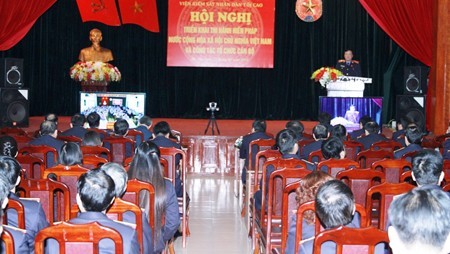(VOVworld) – Human rights regulations are considered the key content in the 2013 Constitution which came into force on January 1st, 2014. Functional agencies have accelerated activities to implement these regulations.
 |
A conference to implement the 2013 Constitution (Photo: VGP)
|
Chapter 2 of the Constitution lists all civil, political, and cultural human rights which have been mentioned in international conventions on human rights. It also mentions the rights of vulnerable groups, old people, women, and children. The Constitution matches international law and political stances on human rights.
Human rights and the rights and obligations of citizens have direct validity
Deputy Head of the National Assembly’s Committee on Legal Affairs Le Minh Thong said that in principle human rights and civil rights and obligations defined in the Constitution must be exercised. It’s necessary to have procedures and regulations to generate the most favorable conditions for people to exercise human rights.
The 2013 Constitution all mentions human rights and citizen rights and obligations, illustrating the responsibility of the state and society in acknowledging, respecting, protecting, and ensuring human rights. For the first time, the Constitution stipulates the rights to live and to enjoy cultural values, freedom to choose a language for communication, and to live in a healthy environment. The Constitution not only defines citizen rights and obligations but also human rights in the Socialist Republic of Vietnam. It shows that the 2013 Constitution has inherited and developed many contents on human rights from previous Constitutions and matches international human rights conventions to which Vietnam is a signatory.
Procurator General of the Supreme People’s Procuracy Nguyen Hoa Binh said: "The overarching spirit of the Constitution is to respect and protect human rights. It has influenced the activities of judicial agencies including the Procuracy. Besides confirming basic human rights, the Constitution also contains regulations to tightly control activities that hamper human rights. Activities restricting the right to live, the right to protect personal information, and other rights must be regulated by legal documents."
10 draft laws related to human rights to be revised
The government plan implementing the Constitution mentions 10 draft laws which have articles related to human rights protection. They include the Criminal Code, the Civil Code, the Law on Family and Marriage, the Labor Code, and the Law on Employment.
According to the Ministry of Justice, revisions to the Criminal Code should include the rights of self-defense at court and immunity from torture.
Because the Civil Code is closely tied to personal information, the revised Civil Code is expected to help people protect their privacy rights. Meanwhile, the revised Law on Marriage and Family includes many human rights regulations such as the right to marry and the right to divorce. The Ministry said that other laws, such as those on the organization of the Court, the People’s Procuracy, and referendums, will also contain articles on human rights.
Professor, Doctor Thai Vinh Thang of the Hanoi University of Law says that the revision of these laws requires the involvement of many experts: "The university’s experts have actively contributed opinions to building laws to realize the Constitution. This year, we will get involved in revising the Laws on the Organization of the National Assembly, the Government, the Court, and the Procuracy, and the Law on the Organization of Local Administration and the Law on Referendum next year. The University will rewrite our curriculum on the Vietnamese Constitution and relevant documents."
Human rights, for the first time, have been strongly and comprehensively affirmed in the Vietnamese Constitution. Rapid institutionalizing the Constitution’s human rights content will ensure its effective implementation.